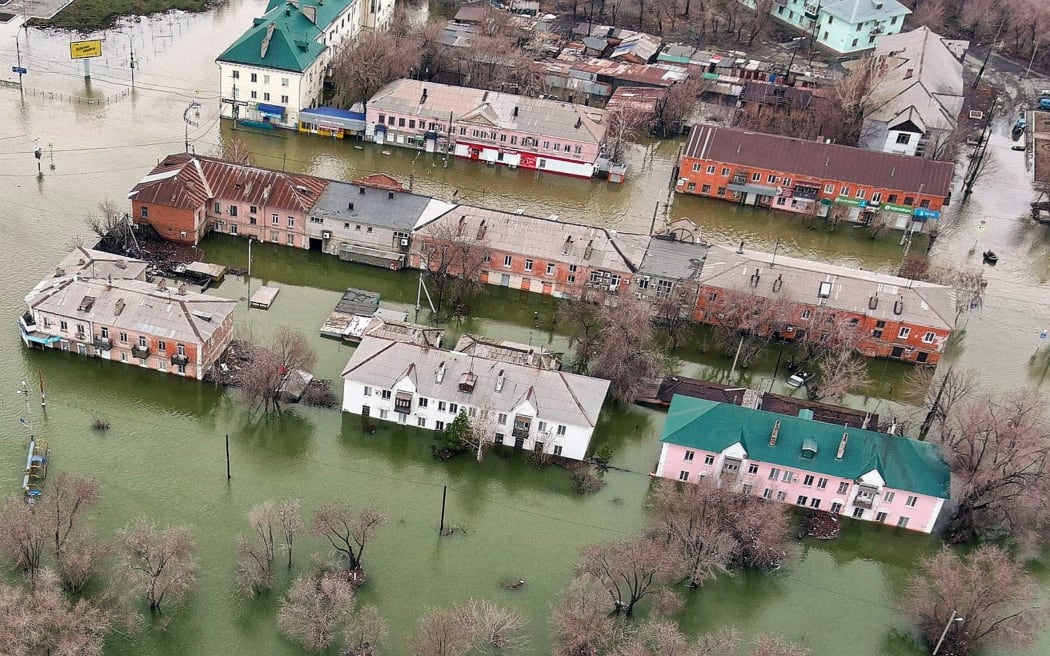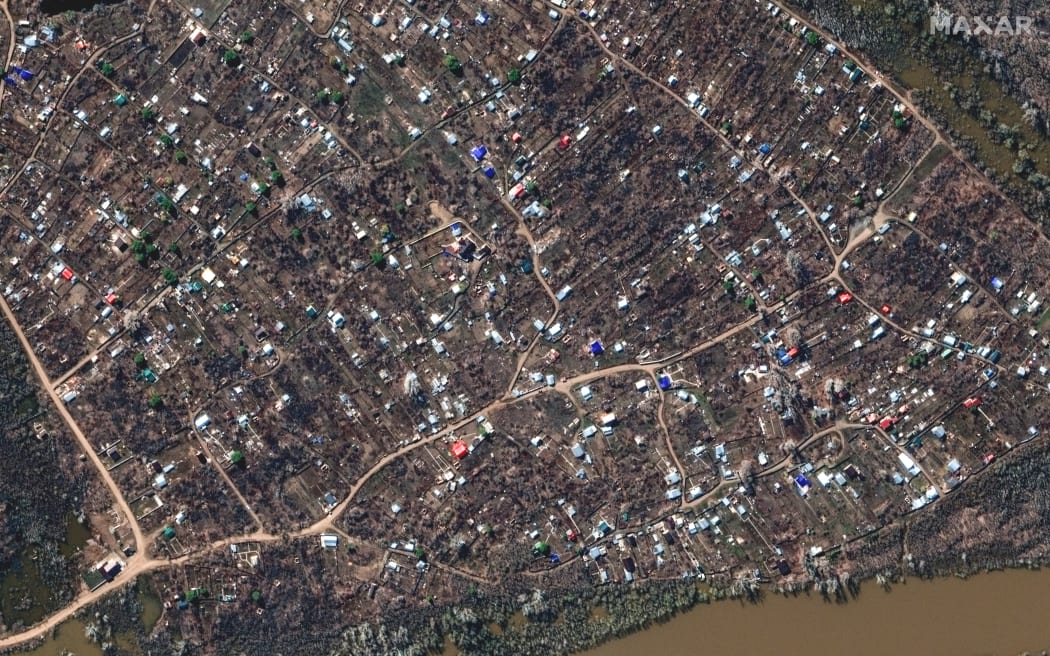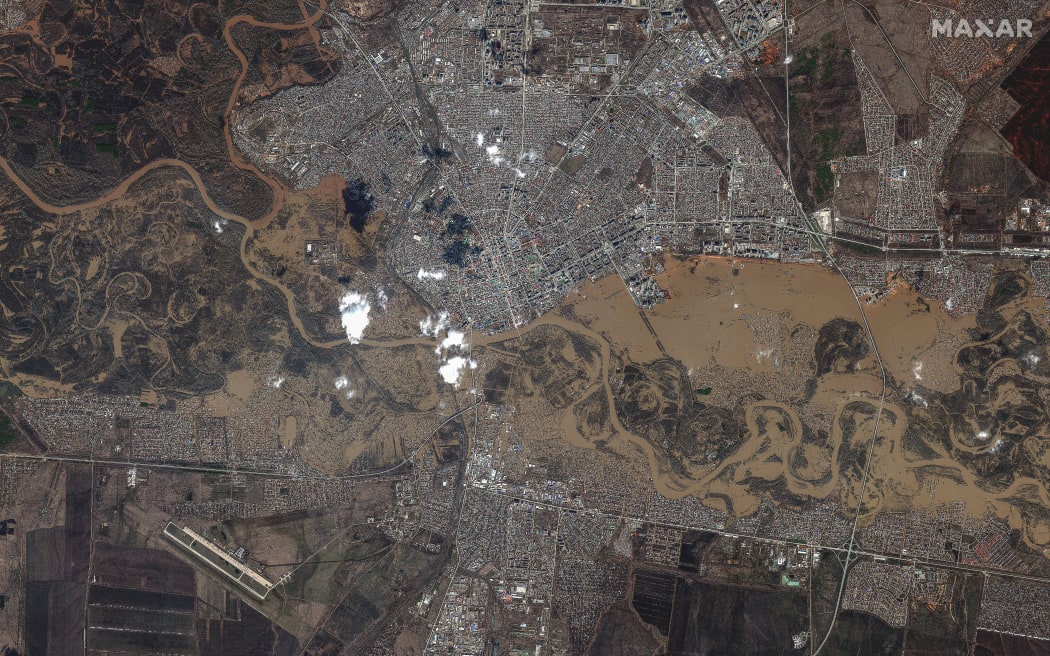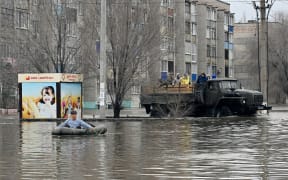By Robert Greenall for the BBC

The flooded part of the city of Orsk, Russia's Orenburg region, southeast of the southern tip of the Ural Mountains. Photo: Anatoliy Zhdanov / Kommersant Photo / AFP
Floods in the Russian city of Orenburg have raised water levels to two metres above critical, leaving just the roofs of some houses showing.
The city's mayor urged many residents to leave home, as sirens sounded.
Levels in Orenburg were likely to peak on Friday (local time), but floods were expected to spread through neighbouring regions over the coming days and weeks.
Kazakhstan has also been badly affected, with 100,000 people evacuated from their homes in the last week.
The flooding was being described as the worst to hit the region in 80 years.
Last week, several rivers - including the Ural, Europe's third-largest - burst their banks. A number flow back and forth between Russia and Kazakhstan.
High seasonal temperatures have led to rapidly melting snow and ice, compounded by heavy rains.
The Ural river reached 11.43 metres in Orenburg on Friday. Authorities said that more than 10,000 people have been evacuated there, and 11,700 homes have been flooded.
Mayor Sergei Salmin has called for further mass evacuations in some districts.
"Leave your homes immediately. The situation is critical, don't waste time!" he said on his Telegram channel, adding that the sirens being heard in the city were not an exercise.
The city has a population of half a million and is about 1500km south-east of Moscow.

Houses along the Ural River, prior to flooding in Orenburg on 6 April, 2024. Photo: Satellite image ©2024 Maxar Technologies / AFP
Local resident Anna Borodina told Reuters her family had been living in their current property for less than a year.
"Yesterday they turned off all communications, there were sirens and we had to evacuate. Our house is flooded and we can't live here. We're looking for somewhere to stay," she said.
Yulia Babenko, who runs an animal shelter in Orenburg, said many owners did not know what to do with their pets.
"We really have a lot of animals here that had owners, not just street animals," she told Reuters.
"Owners also have no place to take their pets to, nothing is organised. So we are forced to organise everything ourselves. It's almost like Noah's Ark here."
Water levels have fallen in Orsk, further east and upstream of Orenburg. Orsk was badly affected last weekend after a dam burst and saw rare public protests against low compensation offers and perceived failures by local authorities to save the dam.
From Orenburg the Ural flows through northwest Kazakhstan and into the Caspian Sea.
The Ishim and Tobol rivers were also reaching dangerous levels, and were only predicted to peak around 23-24 April.

An overview of the Ural River, after the flooding in Orenburg on 11 April, 2024. Flooding in the Russian city of Orenburg became critical the following day. Photo: Satellite image ©2024 Maxar Technologies / AFP
Floodwaters were threatening a whole swathe of northern Kazakhstan and many dams and reservoirs there were filled to capacity.
One resident, Serik Zholdygaly, said his village had been devastated.
"The house, the barn, all the appliances and clothes, everything went under water," he told AP news agency.
"This is my elder brother's house, he got married last year and took a loan out to build it. I helped him as much as I could."
In Petropavl on the Ishim river, in North Kazakhstan region, a local reservoir was threatening to overflow, potentially flooding a major road between two Russian cities - Chelyabinsk and Novosibirsk.
Meanwhile the Russian village of Kaminskoye has been evacuated after levels in the Tobol rose 1.4m overnight, regional governor Vadim Shumkov said.
Kurgan, the regional capital and city of 300,000, lies downstream and was also thought to be at risk.
Shumkov said a dam near the city was being reinforced.
States of emergency have been declared in Kurgan region and in neighbouring Tyumen, in western Siberia.
Flooding often happens in this part of the Eurasian landmass when winter transitions to spring, but there has been nothing on this scale in living memory.
- This story was first published by the BBC


